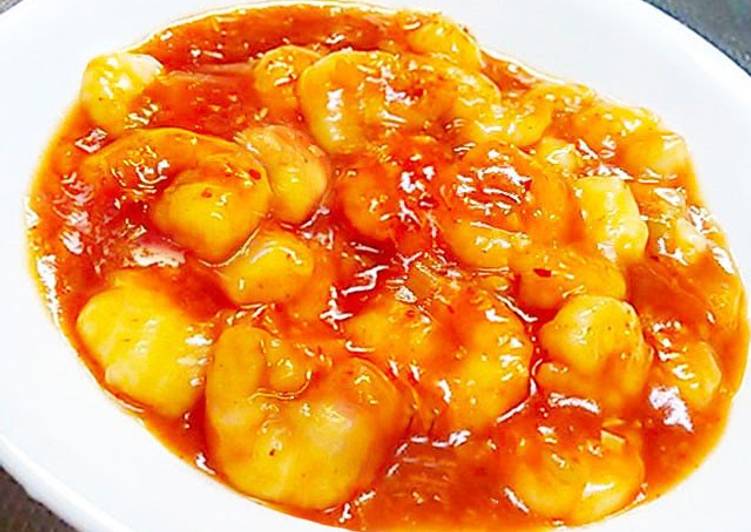Recipe: Appetizing Shrimp In Chili Sauce (Low-Calorie Chinese)
Shrimp In Chili Sauce (Low-Calorie Chinese). It brought back memories of a dish my. I use my homemade chili garlic sauce, though you can use store-bought if you can't find what you need to make the homemade sauce. If using frozen shrimp, thaw the shrimp thoroughly before using.
 Calories per serving of Shrimp in Chili Sauce. How to Make Ebi Chili (Stir-Fried Prawns in Chili Sauce Recipe) Ebi Chiri – Shrimp in Chili Sauce – Cooking Japanese Recipe. You can cook Shrimp In Chili Sauce (Low-Calorie Chinese) using 17 ingredients and 13 steps. Here is how you cook it.
Calories per serving of Shrimp in Chili Sauce. How to Make Ebi Chili (Stir-Fried Prawns in Chili Sauce Recipe) Ebi Chiri – Shrimp in Chili Sauce – Cooking Japanese Recipe. You can cook Shrimp In Chili Sauce (Low-Calorie Chinese) using 17 ingredients and 13 steps. Here is how you cook it.
Ingredients of Shrimp In Chili Sauce (Low-Calorie Chinese)
- Prepare 200 of to 250 grams Peeled shrimp.
- Prepare 1/3 of Japanese leek (roughly chopped).
- You need 1 clove of Garlic (finely chopped).
- It’s 1 dash of Ginger, finely chopped.
- It’s 1 of to 1 1/2 tablespoons Katakuriko (to coat the shrimp).
- Prepare 1 tbsp of Doubanjiang.
- It’s 2 tbsp of Ketchup.
- It’s of Combined seasoning ingredients:.
- Prepare 1 tbsp of ● Sake.
- Prepare 2 of to 3 teaspoons ● Sugar.
- You need 1 dash of ● Pepper.
- Prepare 1/2 tsp of ● Chinese soup stock (granules).
- It’s 1 tsp of ● Katakuriko.
- Prepare 120 ml of ● Water.
- Prepare 1 dash of Salt (for boiling).
- Prepare 1 of to 2 teaspoons Vinegar (for finish).
- It’s 1 tsp of Vegetable oil (for frying).
You know that stuff in the glass bottle you love to buy, well it's. Baked Shrimp in Lemony Garlic Sauce. Shrimp and Herb Salad Recipe This low-calorie shrimp dish comes together easily and quickly in a skillet and is served over a salad packed with greens and herbs. Shrimp in Chili Sauce, often called "Ebi Chili" in Japanese, is stir-fried shrimp in a flavorful ginger-garlic chili sauce.
Shrimp In Chili Sauce (Low-Calorie Chinese) instructions
- Make narrow cuts in the leek about halfway through. Make cuts halfway through on the other side too..
- Chop it up after making the cuts and you'll end up with very finely minced leek. With this method, the cut end of the leek doesn't spread out so it's really easy to chop..
- Combine the doubanjiang and ketchup. Adjust the amount of doubanjiang to taste!.
- Combine the ● flavoring ingredients. Taste to make sure the flavor is right before adding the katakuriko. If it's not salty enough, add a little soy sauce..
- Sprinkle the peeled shrimp with a little sake and salt (neither are listed in the ingredient list), then rinse them well under running water. This removes any fishy smell or dirt..
- Pat the shrimp dry carefully with paper towels. Put the katakuriko for the coating and the shrimp in a plastic bag, close it up and shake it to coat the shrimp..
- Bring water to a boil and add some salt to it. Boil the shrimp in the salted water. They'll be cooked further when mixed with the sauce, so they only need to be cooked about 80%!.
- Put a little vegetable oil in a frying pan, add the garlic and ginger, and turn the heat on..
- When the garlic and ginger have changed color slightly and are fragrant, add the doubanjiang and ketchup. It will splatter so be careful!.
- When you stir fry ketchup, the umami and flavor becomes intensified and really delicious. Stir fry it over low heat so that it doesn't burn, then add the chopped leek..
- When the leek has cooked through, stir up the combined flavoring ingredients (the katakuriko will have sunk to the bottom) and add it to the frying pan..
- When the sauce is bubbling and slightly thickened, add the boiled shrimp. When the shrimp have warmed through, optionally drizzle in some vinegar..
- If you stir it too vigorously the coating on the shrimp may fall off, so stir the pan gently up from the bottom. Transfer to serving plates with plenty of sauce, and enjoy..
This is not a traditional Japanese dish, but Ebi Chili is almost guaranteed to be on the menu of any Chinese restaurant in Japan. Based on Szechwan Shrimp, and the spicy chili paste. A lovely easy Chinese style fermented chili sauce, also known as chopped chili sauce (剁椒) or Hunan Chili Sauce. I use two types of pepper, one is our local large red peppers which have a middle level hotness and more juice. The other one is Chinese small..




